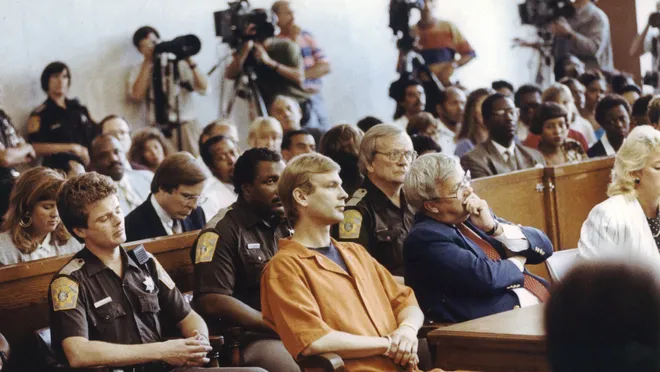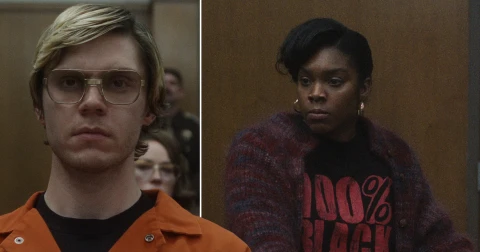Raising Controversy Over Netflix’s “Dahmer” Series Makes People Upset; All You Need To Know
Jeffrey Lionel Dahmer, one of the deadliest serial killers in history, murdered 17 people between 1978 and 1991. How did he go more than ten years without being discovered? Nobody knows (aside from his neighbor, who literally warned the police about him with no success).
In Monster: The Jeffrey Dahmer Story, a new limited series on Netflix, Dahmer is the main subject. True crime fans will learn about his crimes up close, how he lured men to his apartment, and about Glenda Cleveland, a brave woman who sought to alert authorities to Dahmer‘s suspicious conduct.
Who is Jeffrey Dahmer?

Jeffery Dahmer was born to Lionel and Joyce Dahmer in Milwaukee, Wisconsin, on May 21, 1960, and had a regular upbringing. His parents soon noticed that he was less interested in activities, getting farther away, and preferring to be alone.
He took part in typical high school extracurricular activities, such as music and intramural sports. He did admit, though, that at the tender age of 14, he had begun to fantasize about murder and necrophilia. Later, after joining the army, he was honorably discharged.
Raising Controversy Of Dahmer Series On Netflix

The film DAHMER, which Ryan Murphy and Ian Brennan co-created, is by no means the first to depict this serial killer and sex offender. From podcasts to television shows to movies, there is a well-documented excess of true crime entertainment, and there is no dearth of consumers interested in such material. The popularity of true crime has led to serious debates about psychology and ethics.
One day after the Netflix series’ debut, “Dahmer” was among the most popular search terms in the United States. The method the show takes with the relatives of Dahmer’s victims, however, has drawn criticism and resentment. Rather, it was the production’s alleged inability to connect with people.
DAHMER – Monster: The Jeffrey Dahmer Story makes an effort to stand out by telling the story from the perspective of the serial killer’s victims, who were largely men and boys from underrepresented ethnic groups. The new show “will give infamous serial killer Jeffrey Dahmer’s victims a voice,” claims Netflix.
However, relatives of one of Dahmer’s victims have openly criticized Netflix’s production, claiming that they were not informed about the show, and they questioned the need for yet another kind of entertainment media to exploit their misery.
These criticisms gathered traction on Twitter and have since gained greater significance in light of Netflix’s professed commitment to paying tribute to Dahmer’s victims.
I’m not telling anyone what to watch, I know true crime media is huge rn, but if you’re actually curious about the victims, my family (the Isbell’s) are pissed about this show. It’s retraumatizing over and over again, and for what? How many movies/shows/documentaries do we need? https://t.co/CRQjXWAvjx
— eric. (@ericthulhu) September 22, 2022
Eric Perry, who claims to be Errol Lindsey’s cousin, tweeted: “I’m not advising anyone what to watch, I know true crime media is huge rn, but if you’re truly curious about the victims, my family (the Isbell’s) are upset about this documentary.” When Lindsey was killed by Dahmer in 1991, he was 19 years old.

It repeatedly retraumatizes, but for what reason? How many films, TV series, or documentaries do we require?
Perry was responding to a connection between the Netflix dramatization of the incident and his cousin Rita Isbell’s victim impact statement at Dahmer’s trial. Isbell confronts her brother’s killer in the historical film, clearly disturbed, and yelling so loudly that she has to be held by security. This is presented together with actor DaShawn Barnes acting out the action from DAHMER Episode 8.
The video comparison and Perry’s response, which as of this writing has over 400,000 likes and 70,000 retweets, went viral.

In a personal piece that appeared on Insider, Isbell claimed, “I was never approached about the show. “I believe Netflix ought to have inquired about whether we mind or how we felt about creating it. I wasn’t questioned in any way. They simply did it.
Isbell further pointed out that while this show will bring in money for Netflix, none of it will go to the victims’ offspring.
Isbell stated, “It wouldn’t feel so harsh and irresponsible if the show helped them in any manner. “It’s disappointing that [Netflix] is only profiting from this tragedy. That is merely greed.
Perry tweeted, reiterating Isbell’s assertion, “[T]hey don’t notify families when they do this.” They don’t need to notify (or pay!) anyone because everything is public record. My family learned before the rest of the world. No one contacts them when they claim to be acting in this manner “with regard to the victims” or “honoring the dignity of the families.” At this point, my cousins awaken every few months to a flurry of calls and messages informing them that another Dahmer show is about to air. It’s vicious.
The friends and families of murder victims have long opposed their suffering being exploited for entertainment in the true crime genre. Victims’ families have already criticized Netflix for its true crime docuseries The Staircase and I Am A Killer, with some even pleading with the latter’s creators to halt production. Given the popularity of the genre and the prevalence of complaints, it is reasonable to say that such requests don’t always receive the attention they merit.
The viewers may have been reminded that the victims were real people with real families and genuine lives that were cruelly cut short by the contrast between Isbell’s wrath and how it was portrayed by Netflix in DAHMER – Monster: The Jeffrey Dahmer Story.

